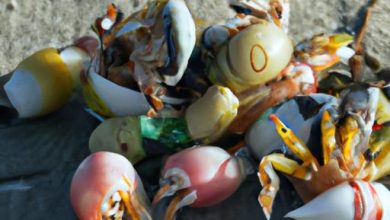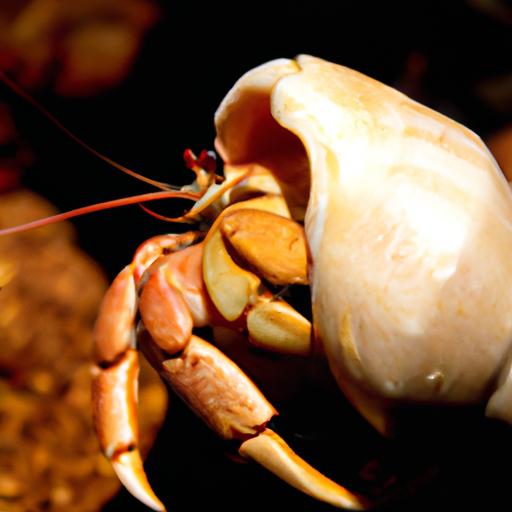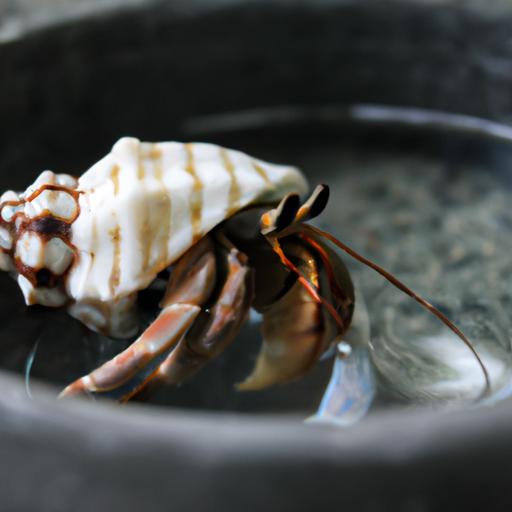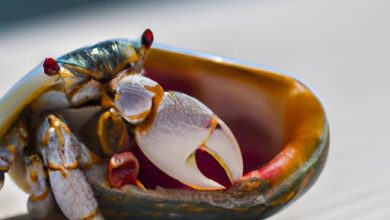Can Hermit Crabs Eat Bloodworms? A Guide to a Balanced Diet for Your Pet
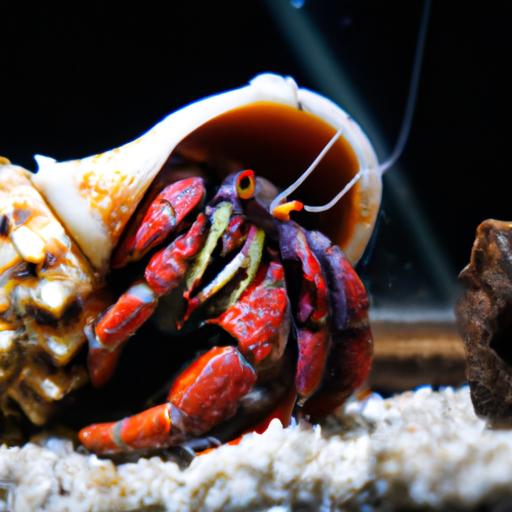
Hermit crabs are fascinating creatures that make unique and low-maintenance pets. But as responsible pet owners, we must ensure they receive a well-rounded diet to thrive. In this article, we’ll explore whether hermit crabs can eat bloodworms, a popular food choice for many aquatic animals. Join me as we delve into the world of hermit crabs’ nutritional needs and discover if bloodworms are a suitable addition to their diet.
A. Brief Explanation of Hermit Crabs as Pets
Before we dive into the specifics of their diet, let’s take a moment to understand hermit crabs as pets. These small crustaceans are known for their habit of occupying empty seashells, which they use as protective shelters. While they may not require constant attention like some other pets, they still need proper care and nutrition to lead a healthy life.
B. Importance of Providing a Balanced Diet to Hermit Crabs
Just like any other living being, hermit crabs require a balanced diet to thrive. Providing them with a variety of nutritious foods not only ensures their growth and vitality but also contributes to their overall well-being. A well-rounded diet aids in maintaining their immune system, shell development, and overall health. By offering a diverse range of foods, we can recreate their natural diet, keeping them happy and healthy in captivity.
Now that we have a basic understanding of hermit crabs and the significance of a balanced diet, let’s explore the nutritional needs of these captivating creatures and determine if bloodworms can be included as part of their meal plan. Stay tuned for the next section where we’ll dive deeper into the nutritional requirements of hermit crabs and their natural diet in the wild.
Understanding the Nutritional Needs of Hermit Crabs
A. Overview of Hermit Crabs’ Natural Diet in the Wild
To understand the nutritional requirements of hermit crabs, we must first look at their natural diet in the wild. These omnivorous creatures scavenge along the shorelines, feasting on a variety of foods such as algae, decaying plant matter, small insects, and even carrion. This diverse diet provides them with the essential nutrients necessary for their growth and survival.
B. Explanation of the Essential Nutrients Required by Hermit Crabs
Just like humans, hermit crabs require a balanced intake of various nutrients to maintain optimal health. These include proteins, carbohydrates, fats, vitamins, and minerals. Proteins are essential for muscle development and repair, while carbohydrates provide energy. Fats are necessary for proper organ function, and vitamins and minerals play crucial roles in metabolic processes and overall well-being.
C. Discussion on the Potential Benefits of Bloodworms as a Food Source
Bloodworms, the larvae of midge flies, are a popular choice for feeding many aquatic animals. These small, red worms are rich in protein and nutrients, making them an attractive option for hermit crabs. The high protein content in bloodworms helps support muscle growth and repair, while their nutrient profile offers a range of vitamins and minerals vital for the crabs’ overall health.
However, it’s important to note that bloodworms should not be the sole component of a hermit crab’s diet. While they can be a valuable addition, providing variety is key to meeting their nutritional needs. In the next section, we will explore whether hermit crabs can safely consume bloodworms and any potential risks or drawbacks associated with their consumption. Stay tuned to discover the verdict on this intriguing topic!
Can Hermit Crabs Eat Bloodworms?
A. Detailed Analysis of Bloodworms as a Potential Food for Hermit Crabs
Bloodworms, commonly used as fish food, might seem like a viable option for feeding hermit crabs. However, it is essential to examine their suitability as a food source for these crustaceans. Bloodworms are actually the larvae of chironomid midges and are rich in protein and other nutrients. While hermit crabs are omnivores, they primarily feed on decaying plant and animal matter in the wild. Therefore, incorporating bloodworms into their diet requires careful consideration.
B. Examination of the Nutritional Value of Bloodworms for Hermit Crabs
Bloodworms can offer some nutritional benefits to hermit crabs. They are a good source of protein, which is crucial for their growth and muscle development. Additionally, bloodworms contain essential amino acids, vitamins, and minerals that contribute to overall health. However, it’s important to note that hermit crabs also require a variety of other nutrients, such as calcium for their shell development and fiber for proper digestion.
C. Consideration of Any Potential Risks or Drawbacks of Feeding Bloodworms to Hermit Crabs
While bloodworms can provide certain nutrients, there are potential risks associated with incorporating them into a hermit crab’s diet. One concern is the high fat content in bloodworms, which may lead to obesity if fed excessively. Additionally, some hermit crabs may have difficulty digesting bloodworms, potentially causing digestive issues or even leading to health problems. It’s crucial to introduce bloodworms gradually and observe how your hermit crab responds to them.
In the next section, we’ll delve into the specifics of how to prepare and feed bloodworms to your hermit crabs, ensuring their safety and dietary needs are met. So, hang tight and let’s explore the proper methods of incorporating bloodworms into your hermit crab’s diet.
How to Feed Bloodworms to Hermit Crabs
A. Step-by-Step Guide on Properly Preparing Bloodworms for Hermit Crabs
Feeding bloodworms to your hermit crabs can be a great way to introduce variety into their diet. However, it’s crucial to prepare them properly to ensure the health and safety of your pets. Follow these simple steps to prepare bloodworms for your hermit crabs:
-
Choose High-Quality Frozen Bloodworms: Opt for high-quality frozen bloodworms from reputable pet stores. Avoid live bloodworms as they may carry parasites or diseases that could harm your hermit crabs.
-
Thaw the Bloodworms: Place a small portion of frozen bloodworms in a separate container and allow them to thaw at room temperature. Avoid using hot water or a microwave to thaw them, as this can destroy essential nutrients.
-
Rinse the Bloodworms: Once thawed, rinse the bloodworms with fresh, dechlorinated water to remove any excess debris or contaminants. Gently swirl the container to ensure thorough rinsing.
-
Drain Excess Water: Use a fine-mesh sieve or colander to drain the excess water from the bloodworms. This step helps prevent excessive moisture in the hermit crabs’ enclosure, reducing the risk of bacterial growth.
B. Discussion on Appropriate Feeding Frequency and Portion Sizes
When it comes to feeding bloodworms to hermit crabs, moderation is key. While bloodworms can be a nutritious addition to their diet, they should not be the sole food source. Here are some guidelines for feeding frequency and portion sizes:
-
Feeding Frequency: Offer bloodworms to your hermit crabs as a treat once or twice a week. This allows them to enjoy the benefits of bloodworms without compromising the balance of their overall diet.
-
Portion Sizes: Consider the size of your hermit crabs when determining the appropriate portion sizes. Offer a small amount of bloodworms that can be consumed within a few hours. Overfeeding can lead to waste and potential health issues.
C. Tips for Introducing Bloodworms into Hermit Crabs’ Diet Without Causing Digestive Issues
Introducing new foods to your hermit crabs requires a gradual approach to prevent digestive issues. Here are some tips to help you introduce bloodworms into their diet smoothly:
-
Start with Small Quantities: Begin by offering a small portion of bloodworms and observe how your hermit crabs react. If they consume the bloodworms without any issues, you can gradually increase the amount over time.
-
Monitor Digestive Health: Keep an eye on your hermit crabs’ droppings and overall behavior after introducing bloodworms. If you notice any signs of digestive distress, such as diarrhea or decreased appetite, discontinue feeding bloodworms and consult a veterinarian.
By following these steps and tips, you can safely incorporate bloodworms into your hermit crabs’ diet, providing them with a nutritious and varied menu. In the next section, we’ll explore alternative food options that can further enhance their overall health and well-being.
Alternative Food Options for Hermit Crabs
A. Diversify Your Hermit Crab’s Diet
To ensure your hermit crabs receive a well-rounded diet, it’s essential to offer them a variety of food options. By introducing different foods, you not only keep their taste buds satisfied but also provide them with a wide range of nutrients necessary for their overall health and longevity. Here are some alternative food choices to consider:
-
Fresh Fruits and Vegetables: Incorporate a mix of fresh fruits and vegetables into your hermit crab’s diet. Opt for options like apples, bananas, carrots, and leafy greens. These foods provide essential vitamins, minerals, and fiber, promoting optimal digestion and overall well-being.
-
Protein-Rich Foods: Alongside bloodworms, hermit crabs can benefit from other protein sources such as shrimp, fish, and cooked chicken. These options offer vital amino acids necessary for growth, repair, and maintenance of their body tissues.
-
Calcium Supplements: Hermit crabs require calcium for shell growth and strength. Offer them crushed eggshells or calcium supplements to ensure their shells remain healthy and robust.
B. Nutritional Benefits of Alternative Food Sources
Each alternative food source brings its unique nutritional benefits to your hermit crab’s diet. Fresh fruits and vegetables provide vitamins and minerals that support their immune system and overall health. Protein-rich foods contribute to their growth and tissue repair, while calcium supplements aid in maintaining a strong and sturdy shell.
C. Importance of a Varied Diet for Optimal Health
Offering a varied diet is crucial to ensure the optimal health of your hermit crabs. Just like humans, these creatures require a diverse range of nutrients to thrive. By rotating their food options and incorporating different sources of nutrients, you provide them with a complete and balanced diet. A varied diet can also prevent boredom and stimulate their natural foraging instincts, contributing to their overall well-being.
Now that we’ve explored alternative food options and the importance of a varied diet for hermit crabs, let’s move on to the conclusion of this article. Stay with me to summarize our findings and provide you with a final verdict on whether hermit crabs can safely devour bloodworms.
Conclusion
After exploring the nutritional needs of hermit crabs and investigating whether bloodworms can be included in their diet, we’ve gained valuable insights into providing a balanced meal plan for these captivating pets.
Hermit crabs require a diverse range of nutrients to ensure their overall health and well-being. While bloodworms can be a tempting option due to their high protein content, it is essential to offer them in moderation. Bloodworms should be considered as occasional treats rather than a staple food due to their potential drawbacks, such as high fat content and the risk of digestive issues.
To provide a well-rounded diet for your hermit crab, it is crucial to incorporate other suitable food options. Consider including a variety of fresh fruits and vegetables, calcium-rich sources, and commercially available hermit crab food. By offering a diverse array of foods, you can mimic their natural diet and provide the necessary nutrients for their growth and vitality.
Remember, when it comes to the specific dietary needs of your hermit crab, it’s always best to consult with a veterinarian or an expert in hermit crab care. They can provide personalized advice based on the individual needs of your pet and ensure their health and happiness.
In conclusion, while hermit crabs can consume bloodworms, it is vital to offer them in moderation and alongside a varied diet. By prioritizing their nutritional requirements and understanding their natural diet, we can create a well-balanced meal plan that promotes the optimal health and longevity of these fascinating creatures.
Thank you for joining me on this journey to uncover the truth about hermit crabs’ dietary needs. For more informative articles and expert advice on hermit crab care, be sure to visit vegetable.kenhtech.com.
Conclusion: So above is the Can Hermit Crabs Eat Bloodworms? A Guide to a Balanced Diet for Your Pet article. Hopefully with this article you can help you in life, always follow and read our good articles on the website: vegetable.kenhtech.com
